Introduction
Can rabbits eat bread? Let’s find out.
So, grab a carrot, snuggle up with your fluffy sidekick, and get ready to embark on a journey into the world of rabbits and bread. We’ll unravel the myths, explore the nutritional value, and uncover how bread can impact their weight, digestion, and overall well-being.
From debunking common misconceptions to understanding the risks and exploring healthier alternatives – this adventure has it all. Together, we’ll navigate the twists and turns, with every hop leading us closer to the truth.
So, let’s dive down the rabbit hole and unveil the secrets of bread – a treat that can either lead to bunny bliss or potential health turmoil. This is going to be one wild ride, my bunny-loving friends!
Let’s hop to it! 🐇
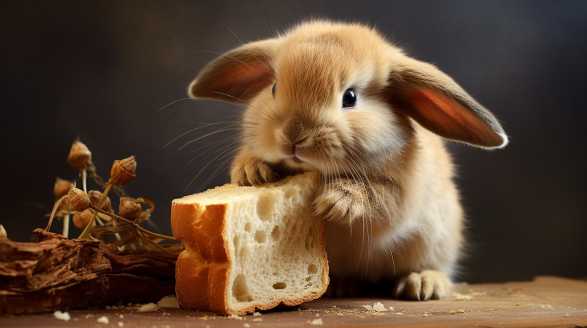
Key Takeaways
- Feeding bread to rabbits can potentially lead to digestive upset, weight gain, and nutrient deficiencies.
- Rabbits have sensitive digestive systems and require a diet high in fiber from hay, fresh leafy greens, and vegetables.
- Bread lacks essential nutrients and should not replace their main diet.
- Occasional treats like fruits, herbs, and commercial rabbit treats can provide variety and enjoyment in moderation.
- Consulting a veterinarian for guidance on a rabbit’s diet is essential for their overall health and well-being.
Bread: A Potential Source of Allergies in Rabbits
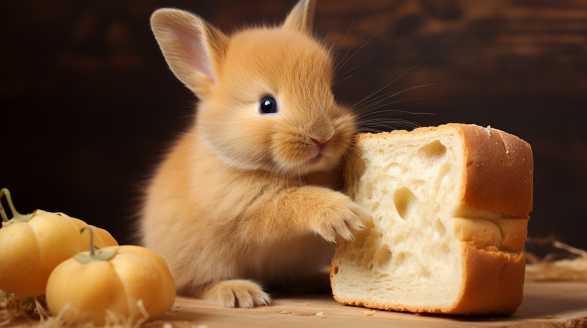
The Bread Conundrum
Many people wonder if it is safe to give bread to their furry friends. After all, it seems harmless, right?
Here are a few things to consider:
- Carbohydrates overload: Bread is rich in carbohydrates, which can be detrimental to a rabbit’s health if consumed in excess. Overfeeding rabbits with bread can lead to obesity, gastrointestinal upset, and even diabetes.
- Lack of essential nutrients: Bread lacks essential nutrients that rabbits need to thrive. Instead of offering them bread, it is best to focus on providing a balanced diet of hay, fresh vegetables, and a small amount of pellets specifically formulated for rabbits.
- Potential allergens: While rabbits usually have a strong digestive system, some individuals may develop allergies or sensitivities to certain ingredients found in bread, such as wheat or gluten. Identifying and avoiding these allergens is vital for preventing discomfort and potential health issues in rabbits.
Allergy Symptoms in Rabbits
Just like humans, rabbits can experience allergic reactions to specific foods. However, unlike us, they can’t tell us how they feel.
Here are some common symptoms of bread allergies in rabbits:
- Skin irritations: Rabbits may develop rashes, redness, itchiness, or hives on their skin. Pay close attention to any unusual behavior, such as excessive scratching or fur loss, which can be signs of an allergic reaction.
- Digestive issues: Upset stomach, diarrhea, or changes in the consistency of the droppings may indicate that your rabbit is having trouble digesting certain food components, including bread.
- Respiratory problems: Allergies can also manifest as respiratory issues in rabbits. If your bunny starts sneezing, wheezing, or displays difficulty breathing, it is crucial to consult with a veterinarian.
- Behavioral changes: Rabbits with allergies may become lethargic, lose their appetite, or show decreased interest in activities they usually enjoy. These behavioral changes could be an indication of discomfort or illness, so it is essential to seek prompt veterinary care.
Safe Alternatives to Bread
Now that we understand the potential risks of feeding bread to rabbits, it’s time to explore safe alternatives that provide proper nutrition without triggering allergies. Here’s a list of rabbit-friendly foods that you can offer instead:
- Fresh leafy greens: Rabbits thrive on a diet rich in leafy greens. Consider providing them with a variety of options such as kale, spinach, romaine lettuce, parsley, and cilantro.
- Hay: High-quality hay, such as timothy or orchard grass, should make up the majority of a rabbit’s diet. It is essential for their dental health and helps regulate their digestive system.
- Pellets: Rabbit-specific pellets contain essential nutrients and should be given in small quantities daily. Ensure the pellets are free from any additives or additional ingredients that could potentially trigger allergies.
- Safe vegetables: Offer rabbits a mix of safe vegetables like carrots, bell peppers, broccoli, and cucumber. Remember to introduce new foods gradually to prevent digestive issues.
- Fruit treats: Fruits should be treats due to their high sugar content. Offer small portions of fruits like apples, strawberries, or watermelon occasionally.
Consulting a Veterinarian
If you suspect that your rabbit may have bread allergies or you observe any symptoms mentioned above, it is crucial to consult a veterinarian. They can provide proper diagnosis and guide you through the dietary changes necessary for your rabbit’s health.
While rabbits have a reputation for being voracious eaters, it is vital to ensure that the foods we offer them are suitable and safe. Avoid the temptation to share your bread with your furry friend, as it can lead to potential allergies and health complications.
By doing so, you can ensure that your adorable rabbit remains healthy, happy, and allergy-free.
Exploring the Impact of Bread on a Rabbit’s Digestive System
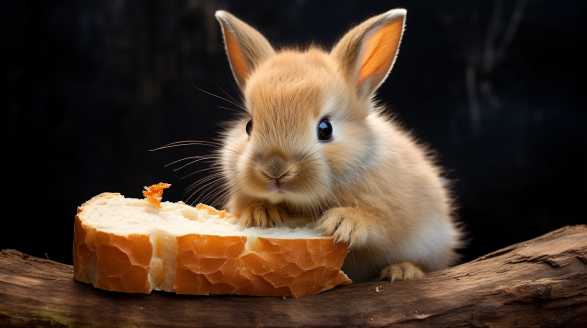
The Bread Conundrum: Can Rabbits Digest It?
Rabbits are herbivores with intricate digestive systems designed to process fibrous plant matter. They thrive on a diet high in hay, fresh greens, and vegetables.
Bread contains refined carbohydrates, added sugars, and preservatives, which can pose a challenge for a rabbit’s delicate digestive system.
A Recipe for Digestive Disruption
When rabbits consume bread, their digestive system goes into a state of perplexity. Here’s a closer look at the impact bread can have on each step of the digestive process:
In the Mouth
Rabbits have front incisors to bite and nibble food, but they lack the ability to chew like humans or other mammals. When they eat bread, it becomes challenging for them to break it down effectively, leading to inefficient digestion.
In the Stomach
Once ingested, bread begins its journey through the rabbit’s stomach. However, rabbits have a unique digestive system adapted for breaking down fibrous foods.
In the Small Intestine
As bread enters the small intestine, it can cause further chaos. The refined carbohydrates and sugars in bread can upset the natural balance of the rabbit’s gut flora.
In the Cecum
The cecum, a specialized organ found in rabbits, plays a crucial role in their digestive system. It breaks down fibrous foods and extracts maximum nutrition.
The high sugar content in bread can lead to an imbalanced cecal environment, risking digestive disorders such as diarrhea and bloating.
In the Colon
Finally, bread reaches the colon, where water absorption takes place. Bread’s refined nature can interfere with water absorption, potentially leading to dehydration in rabbits.
Bread Alternatives: A Rabbit-Friendly Diet
Considering the potential drawbacks of bread, it’s essential to provide rabbits with a diet that promotes their well-being. Here are some rabbit-friendly alternatives to consider:
1. High-Quality Hay
Hay is the cornerstone of a rabbit’s diet. It provides essential fiber, aids in digestion, and promotes dental health.
2. Fresh Vegetables and Greens
Leafy greens, such as kale, spinach, and romaine lettuce, should be a substantial part of a rabbit’s diet. Ensure the greens are fresh and free from pesticides, offering a varied selection to provide a balanced nutritional profile.
3. Limited Pellets
Pellets, specifically designed for rabbits, can supplement their diet. However, moderation is key.
Consult with a veterinarian to determine the appropriate portion size for your rabbit.
4. Occasional Treats
Treats can be an enjoyable part of a rabbit’s life, but they should be offered sparingly and in moderation. Opt for rabbit-safe treats such as small pieces of apple, carrot, or fresh herbs like parsley.
In my quest to understand the impact of bread on a rabbit’s digestive system, I discovered a complex relationship between rabbits and this seemingly innocuous food. While rabbits can consume tiny amounts of bread without immediate harm, it’s best to refrain from offering it regularly.
As rabbit owners, it’s our responsibility to make informed decisions and prioritize our furry friends’ well-being.
Does Bread Consumption Influence a Rabbit’s Lifespan?
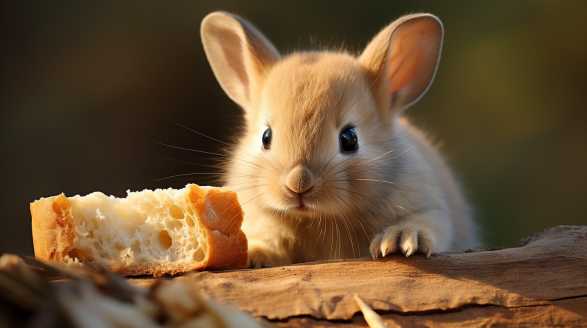
The Bread-Consuming Bunny Myth
Before we look into the nitty-gritty of this topic, let’s dispel a common myth. There is a prevalent belief that rabbits thrive on bread, which is not accurate.
A well-balanced diet for rabbits should consist mainly of hay, fresh veggies, and pellets.
The Surprising Bread Bunny Connection
So, now that we know bread is not a rabbit’s bread and butter (pun intended), you might be wondering why we’re even discussing this topic. Well, the intriguing aspect lies in the occasional indulgence rabbits have with this carb-packed delicacy.
Rabbit Metabolic Rate
Rabbits have incredibly high metabolic rates—no wonder they’re always bouncing around with never-ending energy! This rapid metabolic rate accelerates their digestive processes, and they can efficiently break down certain foods faster than other animals.
Essential Nutrients in Bread
Bread contains essential nutrients like carbohydrates, fiber, and protein. While it should never substitute a rabbit’s main diet, consuming small amounts of bread occasionally can provide rabbits with some additional nutrients, especially fiber, which aids in proper digestion.
The Controversial Bread Affair
Now we get to the contentious part: does bread consumption influence a rabbit’s lifespan?
The Argument Against Bread
Some rabbit experts argue that introducing bread into a rabbit’s diet could lead to health complications. They claim that bread might disrupt the delicate balance of a rabbit’s digestive system, potentially causing diarrhea, bloating, or even obesity.
However, these concerns primarily arise when bread becomes a significant part of a rabbit’s diet, replacing essential nutrients they require from their main meals. Moderation is key!
The Balance is Everything
So, what’s the verdict? Like many aspects of pet care, it all comes down to balance.
However, bread should never replace their daily essentials or become a significant aspect of their nutrition.
Bread Alternatives for a Hoppy Bunny
If you’re concerned about the potential risks associated with bread consumption, worry not! There are plenty of healthier alternatives to keep your beloved bunny satisfied and entertained.
Leafy Greens Galore
Rabbits have a natural affinity for leafy greens, making them perfect for satisfying their cravings. Introduce a variety of greens, such as kale, spinach, and romaine lettuce, into their diet.
Hay, Hay, and More Hay
Hay is a staple for rabbits, and you can never offer them too much of it! Not only does it provide essential fiber, but it also keeps their teeth in check and prevents dental issues.
Rabbit-Safe Fruits and Veggies
Carrots, apples, strawberries, and bell peppers are just a few examples of delicious fruits and veggies that rabbits can enjoy. These treats are not only tasty but also provide a healthy dose of vitamins and minerals.
While the debate around bread consumption and rabbit’s lifespan may continue, we can’t underestimate the importance of a well-balanced diet for our furry friends. Bread, when given in moderation, can be a delightful treat for rabbits, adding a burst of excitement and flavor to their lives.
So, let’s embrace moderation, show our bunnies some love, and keep them bouncing happily along the path of a long and healthy life!
The Effects of Bread on a Rabbit’s Weight and Overall Health
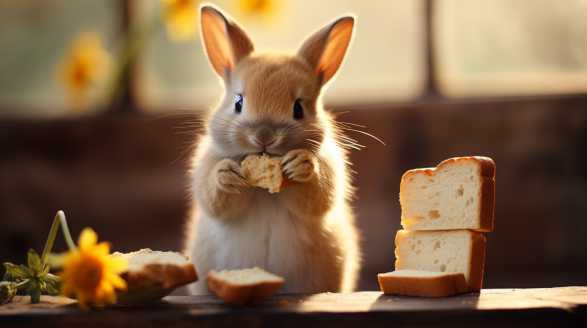
The Bread Binge: Beyond the Crumbs
Rabbit Delight or Hidden Danger?
When we see our adorable bunnies beg for scraps of bread, it’s hard to resist their pleading eyes. However, it is crucial to understand the potential consequences of indulging them.
Piling on the Pounds: Rabbit Obesity
Beware the Bunny Bulge
Rabbits are naturally herbivores, thriving on fresh greens, hay, and limited treats. Bread, on the other hand, is full of carbohydrates, sugars, and fats that can lead to rapid weight gain.
- Unwanted Weight Gain:
- Bread lacks the necessary nutrients, causing rabbits to consume more than their required calorie intake.
- Excessive bread consumption can lead to obesity, affecting their mobility and overall health.
- Obesity increases the risk of various health issues, such as cardiovascular problems, arthritis, and difficulty grooming.
- Nutrient Imbalance:
- Rabbits need a diet high in fiber and low in carbohydrates and fats.
- Bread disrupts this balance, potentially causing digestive problems, tooth decay, or even liver disease.
Bread Crumbs of Deception: Hidden Risks
The Wheaty Woes
While bread may seem harmless, it poses hidden risks that could negatively impact your rabbit’s health and lifespan. Understanding these risks can help you make informed decisions regarding your bunny’s diet:
- Gastrointestinal Upsets:
- The high carbohydrate content in bread can lead to diarrhea, gas, and bloating in rabbits.
- The delicate ecosystem within their digestive system can be disrupted, causing discomfort and potential health complications.
- Yeast: A Fermenting Foe:
- Yeasty bread dough can be extremely harmful to rabbits if ingested.
- The yeast can ferment within their digestive tract, producing alcohol and causing severe bloating, pain, and potential alcohol poisoning.
- Allergic Reactions:
- Some rabbits may develop allergies to certain ingredients in bread, such as wheat or gluten, leading to allergic reactions like skin irritation, itching, or respiratory distress.
A Balanced Bunny: Healthy Choices, Happy Rabbit
Optimal Alternatives to Bread
Now that we understand the risks associated with feeding bread to rabbits, it’s time to explore healthier options. Here are some fantastic alternatives that will keep your rabbits happy and healthy:
- Fresh Greens:
- Leafy greens like romaine lettuce, cilantro, and parsley are excellent sources of essential vitamins and fibers.
- They provide dietary enrichment, helping maintain a healthy weight and digestion for your furry friend.
- Hay: The Rabbit’s Superfood:
- Timothy hay and other varieties are a staple in a rabbit’s diet, promoting proper digestion and dental health.
- Keep an abundance of fresh hay available at all times to encourage grazing behavior.
- Occasional Treats:
- Treats should be limited and chosen carefully. A small piece of carrot or apple can be an exciting snack for your rabbit, providing vitamins and entertainment.
While it may be tempting to share some bread with your rabbit, it’s best to resist their adorable bunny eyes. Bread consumption can lead to weight gain, nutrient imbalances, and hidden risks that could impair their overall health.
By opting for a balanced diet consisting of fresh greens, hay, and occasional rabbit-friendly treats, you can ensure your furry friend’s well-being and longevity.
Remember, as an owner, it’s essential to put your rabbit’s health first, even if it means saying no to bread. Your bunny will thank you with binkies and happy hops!
Alternative Treats for Rabbits: What to Feed Instead of Bread
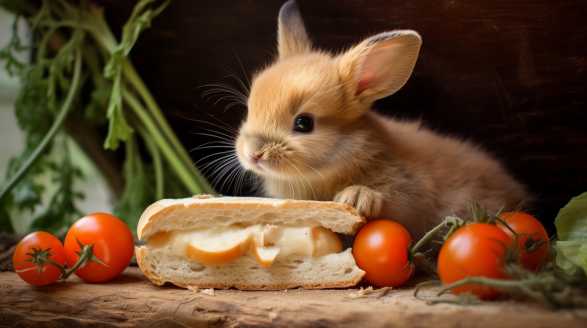
Why Bread is Not Ideal for Rabbits?
Before we look into the alternatives, it’s important to understand why bread should be avoided when it comes to feeding rabbits. Bread is typically high in carbohydrates and lacks the essential nutrients that rabbits need to thrive.
So, let’s move forward and discover some rabbit-friendly treats!
Fresh Vegetables – Nature’s Delight
Rabbits are herbivores and their digestive systems are perfectly designed to process fresh vegetables. Incorporating a variety of veggies into their diet not only provides vital nutrients, but also adds excitement to their mealtime.
- Leafy greens such as kale, romaine lettuce, and spinach
- Cruciferous vegetables like broccoli and cauliflower
- Herbs like parsley, cilantro, and basil
- Root vegetables including carrots and radishes
- Bell peppers, both green and red, for a touch of sweetness
Remember, it’s important to introduce new vegetables gradually to avoid any tummy troubles for your furry friend. And always wash the vegetables thoroughly before offering them to your bunny.
Fruits: Healthy Sweet Treats
Who doesn’t love a sweet treat every now and then? Rabbits surely do!
Here are some fruits that rabbits can enjoy:
- Apples (remove the seeds and core)
- Blueberries
- Strawberries
- Blackberries
- Banana (in small quantities due to its high sugar content)
- Pear
A Dash of Herbs and Flowers
Just like us, rabbits appreciate a touch of tantalizing flavor. Adding fresh herbs and flowers to their diet can provide a burst of excitement and introduce new tastes.
- Dandelion greens and flowers
- Mint leaves
- Rosemary
- Chamomile
- Hibiscus flowers
- Lavender
Not only do these herbs and flowers provide a tasty variation to their meals, but some also offer additional health benefits. For example, chamomile can have a calming effect on rabbits, while dandelion greens act as a natural diuretic.
Fiber-Rich Hay Keeps Them Happy
Hay is an essential part of a rabbit’s diet as it provides the necessary fiber for a healthy digestive system and helps wear down their constantly growing teeth. Timothy hay and orchard grass are excellent choices, and you can also consider feeding your rabbits alfalfa hay when they are young to provide extra calcium.
Limit the Treats
While it’s exciting to discover new and delicious treats for your rabbits, it’s important to remember that treats should only make up a small part of their diet. A balanced diet primarily consisting of hay, fresh vegetables, and a limited amount of pellets is crucial for their overall well-being.
Now that you know the problems associated with feeding bread to your rabbits and the plethora of alternative treats available, you can make informed choices to keep your furry friends healthy and happy. By incorporating fresh vegetables, fruits, herbs, flowers, and providing an ample supply of hay, you can create a varied and exciting diet for your rabbits.
So go ahead, explore the endless possibilities of treats for your rabbits and watch them hop with joy!
Bread-Induced Digestive Problems in Rabbits: What Every Owner Should Know
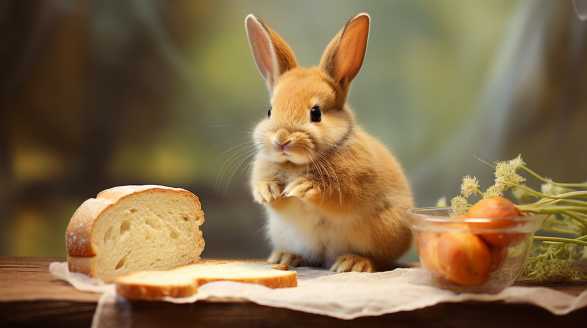
The Temptation of Bread: A Deceptive Snack
It’s almost impossible to resist the aroma of freshly baked bread wafting through the air. The same goes for our rabbits.
Bread, which is primarily made from wheat flour, lacks the nutrients required for a rabbit’s optimal health. Here’s why bread can be a major concern for rabbits:
- Digestive Upset: Rabbits have a fairly sensitive digestive system that is designed to process high-fiber foods like hay and leafy greens. The refined flour used in bread lacks the appropriate fiber content, leading to digestive discomfort and an upset stomach for our furry companions.
- Obesity Concerns: Bread is packed with carbohydrates, which can lead to weight gain in rabbits. Obesity not only affects their mobility but also puts them at risk for a myriad of health issues, including arthritis, cardiovascular problems, and even a shortened lifespan.
- Dental Problems: Chewing on hard, dry bread can lead to dental issues in rabbits. Their teeth are continuously growing, and a diet lacking in proper fiber can impede proper wear, causing teeth to overgrow and leading to pain, difficulty eating, and potential abscesses.
The Tall Tales of Bread: Dispelling Common Myths
Now that we understand the potential dangers of bread for rabbits, let’s address some common misconceptions floating around:
Myth 1: “Rabbits Can Safely Eat All Types of Bread!”
This statement could not be further from the truth. While some rabbit owners may have experienced their bunnies consuming bread without apparent problems, we must remember that every rabbit is unique.
Myth 2: “Bread Is a Nutritious Addition to My Rabbit’s Diet!”
Bread is essentially a calorie-dense empty filler, devoid of the necessary nutrients for a rabbit’s well-being. High-quality hay, fresh water, and limited portions of rabbit-safe leafy greens are the key components of a balanced diet for these adorable herbivores.
Myth 3: “Offering Bread as a Treat is a Great Way to Bond with My Rabbit!”
Bonding with your rabbit is crucial, but offering them unhealthy treats like bread is not the way to go. Instead, opt for safe, rabbit-friendly treats like small pieces of fresh fruit or vegetables, such as apples or carrots, which can be given sparingly and as part of a varied diet.
A Bunny’s Bread Alternatives: Delicious and Nutritious Choices
Now that we have clarified the risks associated with bread, you may wonder what alternatives exist to keep your rabbit satisfied and healthy. Here are some fantastic rabbit-friendly options:
- Fresh Hay: As mentioned earlier, high-quality, fresh hay is the foundation of a rabbit’s diet. It provides essential fiber, aids in digestion, wears down teeth naturally, and promotes overall well-being.
- Leafy Greens: A wide variety of leafy greens like romaine lettuce, cilantro, and dandelion greens can be offered to rabbits in small quantities. Ensure they are washed thoroughly to remove any potential pesticides.
- Rabbit-Specific Pellets: Rabbit pellets formulated with the correct balance of nutrients are a useful addition to their diet. Remember to choose high-fiber pellets with minimal fillers.
- Herbs: Bunny-friendly herbs, such as parsley and basil, can spice up their palate while offering additional nutrients.
It is crucial for every rabbit owner to be aware of the potential risks bread poses to their furry friends’ digestive system. By steering clear of bread and opting for a balanced, fiber-rich diet, we can ensure our rabbits thrive and enjoy a long, healthy life by our side.
Myths and Facts: Debunking Common Misconceptions About Feeding Bread to Rabbits
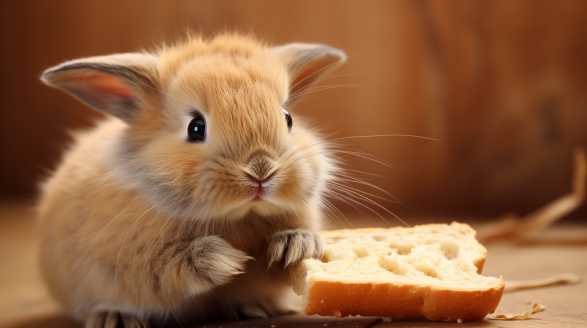
Buckle up, rabbit lovers!
Rabbits are adorable creatures that capture our hearts with their fluffy tails and twitching noses. However, when it comes to their dietary needs, it’s crucial to separate fact from fiction.
Myth: Bread is a healthy food option for rabbits.
Contrary to popular belief, bread is NOT a healthy food for our furry friends. While rabbits can consume small amounts of bread occasionally, their primary diet should consist of fresh hay, vegetables, and pellets specially formulated for their nutritional needs.
Fact: Bread lacks essential nutrients for rabbits.
Bread is primarily made from refined wheat flour, which lacks the necessary fiber and nutrients that rabbits need to maintain a balanced diet. Feeding bread in excess can lead to health issues, such as obesity, digestive problems, and nutrient deficiencies.
Myth: Bread provides energy for rabbits.
It’s true that bread contains carbohydrates, which can provide a temporary energy boost. However, the type of carbohydrates found in bread is not ideal for rabbits.
Bread lacks the necessary fiber content and can lead to gastrointestinal issues.
Fact: Rabbits need a high-fiber diet.
Rabbits thrive on a high-fiber diet, primarily consisting of hay. Hay aids in digestion, keeps their teeth healthy, and promotes a healthy weight.
Myth: Bread is a good way to treat rabbits.
While offering a small piece of bread as an occasional treat won’t harm your rabbit, it should not be a regular occurrence. Rabbits have sensitive digestive systems and need a consistent diet that meets their nutritional requirements.
Fact: There are healthier alternatives for rabbit treats.
If you’re looking for suitable treats for your rabbit, consider fresh fruits and vegetables that are safe for them to consume. These include carrots, apples (without seeds), leafy greens, and even small amounts of berries.
Myth: Bread can help rabbits gain weight.
Feeding bread to underweight rabbits to help them gain weight is another common misconception. While bread may provide temporary weight gain, it does not offer the necessary nutrients for long-term healthy growth.
Fact: Consult your veterinarian for feeding advice.
If you have concerns about your rabbit’s weight or diet, it’s essential to consult with a veterinarian who specializes in small animal care. They can provide tailored advice and recommendations to ensure your rabbit maintains a healthy weight and receives the proper nutrition they need.
Myth: All rabbits can eat bread without any issues.
Each rabbit is unique and may react differently to certain foods. While some rabbits may consume bread without experiencing immediate problems, it doesn’t mean that it is a suitable food for them.
Fact: Stick to a rabbit’s natural diet.
The best way to ensure a rabbit lives a long and healthy life is to stick to their natural diet. Providing a balanced diet of hay, vegetables, and quality pellets will promote their overall well-being, digestion, and dental health.
Bust those myths and put your rabbit’s health first!
As rabbit owners, it is our responsibility to provide the best care possible for our furry companions. Debunking popular myths and misconceptions about feeding bread to rabbits is essential in ensuring their well-being.
Key Takeaways:
- Bread is not a healthy food option for rabbits. It lacks the necessary nutrients and fiber they need.
- Rabbits require a high-fiber diet primarily consisting of fresh hay, vegetables, and pellets.
- Bread should only be offered as an occasional treat and not as a regular part of their diet.
- There are healthier alternatives for rabbit treats such as fresh fruits and vegetables.
- Consult a veterinarian for tailored advice on your rabbit’s diet and weight management.
- Stick to a rabbit’s natural diet to promote their overall health and well-being.
By dispelling these myths and embracing the facts, we can provide our beloved rabbits with the proper nutrition they need to live long, happy lives. Let’s prioritize their health and well-being and give them the best chance at a hoppy, healthy existence!
The Cons of Feeding Bread to Rabbits: A Comprehensive Guide

The Cons
1. Lack of Essential Nutrients
While bread can provide energy, it may lack essential nutrients that are crucial for a rabbit’s overall health and wellbeing. It is low in fiber, proteins, vitamins, and minerals that are necessary for their digestive system and overall growth.
2. Digestive Upset
Rabbits have a sensitive digestive system, and feeding them bread can lead to digestive upset. The refined flour and high sugar content in bread can cause bloating, diarrhea, and even more severe gastrointestinal issues.
3. Obesity Risks
Bread often contains added sugars and unhealthy fats, which can contribute to obesity in rabbits if consumed regularly. Weight gain can lead to various health problems, including joint issues, heart disease, and decreased lifespan.
4. Dental Problems
Bread’s soft and mushy texture requires minimal chewing, which can be detrimental to rabbits’ dental health. Chewing on fibrous foods, such as hay and leafy greens, helps wear down their continually growing teeth.
5. Allergic Reactions
Just like humans, rabbits can have food sensitivities and allergies. Bread contains gluten, which some rabbits may be intolerant to, leading to allergic reactions.
Feeding bread to rabbits can be a controversial topic, given the pros and cons associated with it. While bread can provide momentary energy, act as a training treat, and add variety to their diet, the lack of essential nutrients, digestive upset, obesity risks, dental problems, and potential allergic reactions must be carefully considered.
As a responsible rabbit owner, it’s crucial to prioritize your furry friend’s health and wellbeing. Instead of relying on bread, focus on providing a well-balanced, fiber-rich diet consisting of fresh hay, leafy greens, vegetables, and a small portion of high-quality rabbit pellets.
Remember, when it comes to your rabbit’s diet, consult with a veterinarian for professional advice tailored to your bunny’s specific needs. Your furry friend will thank you with their binkies and happy hops!
The Surprising Link Between Bread Consumption and Obesity in Rabbits
The Bread Bunny Conspiracy: Fact or Fiction?
Before we look into the nitty-gritty details, let’s address the burning question on everyone’s minds – is there really a link between bread consumption and obesity in rabbits, or is it just a clever ruse cooked up by mischievous bunnies? Well, my dear readers, prepare to be amazed because this rabbit hole goes deeper than you ever imagined!
A Refined Rabbit Diet: The Bread Breakdown
To understand the potential link between bread and rabbit obesity, we must first examine what goes into their diet. Rabbits are herbivores and naturally graze on grasses, leaves, and even the occasional carrot.
However, when it comes to bread, things take an unexpected turn.
Bread: Not Quite a Bunny’s Cup of Tea
Bread, a culinary delight for humans, might not be the best choice for our long-eared friends. Let’s break it down:
- High Caloric Content: Bread is notorious for its high calories. Just one slice of bread could pack around 70-80 calories – that’s a lot for a rabbit!
- Low Fiber: Unlike their natural grassy diet, bread contains significantly lower fiber content. This lack of fiber can disrupt their digestive system and lead to various health issues.
- Processed Ingredients: Many bread varieties contain additives, preservatives, or even sugar – all of which are unnatural for rabbits.
While a tiny piece of bread every now and then may not cause instant harm, consistent consumption can have surprising consequences for our fluffy friends.
The Rabbit Obesity Puzzle: Connecting the Dots
Now, let’s piece together the puzzle and uncover the surprising link between bread consumption and rabbit obesity. We’ll explore some key factors that contribute to this weighty issue.
Insidious Weight Gain: A Silent Battle
Rabbits are masters at hiding their weight gain, making it tricky to detect obesity before it becomes a serious problem. These furtive furballs may appear healthy on the outside while inwardly harboring layers of excess weight.
Slow-Motion Digestion and Bread’s Impact
Rabbits have a unique gastrointestinal system that is designed to handle a high-fiber diet. However, bread disrupts their natural digestive process, leading to slower digestion, reduced nutrient absorption, and potential weight gain.
- Bread and Fermentation: When a rabbit consumes bread, the carbohydrates in it can ferment in their sensitive gut. This fermentation process produces gas, leading to bloating and discomfort.
- Weighty Water Retention: Bread is known to cause water retention, which can result in temporary weight gain. Rabbits are no exception to this phenomenon.
- Empty Calories: Bread provides little nutritional value for rabbits compared to their natural diet. Essentially, they’re consuming calories without the essential nutrients they need to thrive.
Heavy Hare: The Surprising Rise in Rabbit Obesity
Now that we have established the connection between bread and rabbit obesity, let’s explore the alarming rise in this issue among our adorable, floppy-eared companions.
Rise of Indulgence: Human Influence
Humans often fall prey to spoiling our pets, and rabbits are no exception. We tend to shower them with treats that may not be in their best interest.
The “Everything in Moderation” Myth
We’ve all heard the age-old adage, “Everything in moderation.” While it holds some truth for humans, rabbits have different dietary needs.
Sedentary Lifestyle: More Than Meets the Eye
Pet rabbits, especially those kept indoors, may not have the luxury of hopping around freely like their wild counterparts. This sedentary lifestyle, combined with a diet high in bread, can pave the way for rapid weight gain and a host of health issues.
As our journey nears its end, we can now confidently say that the surprising link between bread consumption and obesity in rabbits is far from a myth. While the occasional nibble might not be the end of the world, consistent bread consumption can impact these furry friends in unexpected and unwanted ways.
As responsible pet owners and rabbit enthusiasts, it’s crucial to provide our adorable companions with a wholesome diet tailored to their specific needs. Opting for nutritious alternatives such as fresh vegetables, grass hay, and occasional rabbit-specific treats can help prevent obesity and maintain their overall well-being.
So, let’s bid aye to bread, and say hello to a healthier, happier rabbit kingdom! Let this fascinating discovery serve as a reminder that sometimes, the smallest of changes can make the biggest impact.
Stay curious, my friends!
Understanding the Nutritional Value of Bread for Rabbits
Rabbit Diets: Herbivores Extraordinaire
Before we look into the nutritional value of bread, let’s briefly discuss the dietary habits of rabbits. Rabbits are herbivores, which means their diet primarily consists of plant-based foods.
The Risks of Bread for Rabbits
While bread might seem like a harmless treat, rabbits’ digestive systems are not designed to process it effectively. Here are a few reasons why offering bread to rabbits can be risky:
- Lack of Essential Nutrients: Bread lacks a significant amount of the essential nutrients required by rabbits, such as fiber, vitamins, and minerals. Feeding them bread instead of their regular diet can lead to nutrient deficiencies.
- Digestive Upset: The digestive system of rabbits is sensitive and relies on a delicate balance of beneficial bacteria. Bread is typically high in carbohydrates and can upset this balance, leading to digestive issues like bloating, diarrhea, and even potentially life-threatening conditions.
- Weight Gain: Bread is calorie-dense and can easily contribute to excessive weight gain in rabbits. This can lead to a variety of health problems, including arthritis, heart issues, and decreased mobility.
- Reduced Hay Consumption: Offering bread as a treat may discourage rabbits from consuming their necessary daily intake of hay, which is essential for maintaining optimal digestive health.
Optimal Diet for Rabbits
Now that we have established the potential risks of feeding bread to rabbits let’s focus on their optimum diet. For a healthy and happy bunny, their diet should consist of the following:
- Hay: High-quality grass hay, such as Timothy, should make up the majority of a rabbit’s diet. It aids in digestion, provides essential fiber, and helps wear down their constantly growing teeth.
- Fresh Leafy Greens: Offer a variety of fresh, dark leafy greens like romaine lettuce, kale, and cilantro to provide essential vitamins and minerals.
- Vegetables: Introduce a variety of vegetables into their diet, including bell peppers, broccoli, and carrots. Remember to introduce new vegetables gradually to prevent digestive upsets.
- Water: Always ensure your rabbit has access to fresh, clean water at all times.
Rabbit Treats: The Bunny Bonuses
While bread may not be an ideal treat for rabbits, there are plenty of other options that can add excitement to their diet. Here are some of the rabbit-approved treats you can offer your furry friend:
- Fresh Fruits: In moderation, fruits like apples, bananas, and strawberries can be a tasty and healthy addition to your rabbit’s diet. Remember to remove any seeds or pits before offering fruits to avoid potential hazards.
- Herbs: Rabbits often enjoy nibbling on herbs like parsley, dill, and mint. These aromatic treats can provide additional flavors and contribute to their overall enjoyment.
- Occasional Commercial Rabbit Treats: There are specially formulated rabbit treats available in pet stores that can be given as an occasional indulgence. Ensure these treats are made with natural ingredients and avoid those containing added sugars or artificial additives.
While bread may be a delight for us humans, it is not an appropriate food choice for our beloved rabbits. Their dietary needs are best met through a combination of high-quality hay, fresh leafy greens, and a variety of vegetables.
Keeping our fluffy companions healthy and happy requires understanding and respecting their nutritional needs. So, let’s hop to it and ensure our furry friends receive the best diet possible!
Now, go ahead and share your knowledge with fellow rabbit enthusiasts and help spread the word about the nutritional value of bread for rabbits. Happy rabbit-raising!
Conclusion
It has been fun exploring the mysterious link between bread and rabbits! We’ve hopped through the rabbit hole, debunked myths, and uncovered the truth about bread’s impact on our fluffy friends.
Along this wild ride, we’ve learned that bread, while tempting, is not the ideal treat for rabbits. Its lack of essential nutrients, potential for digestive upset, and contribution to weight gain make it a risky choice for our long-eared companions.
By understanding the unique dietary needs of rabbits and providing a balanced and nutritious diet, we can ensure our fluffy friends live long, healthy, and hoppy lives. But it doesn’t end there!
So, whether you’re an experienced rabbit owner or thinking about bringing one into your life, remember to tread carefully when it comes to bread. Take the time to educate yourself on the best care practices and offer a diet that nourishes their bodies and keeps them full of energy and joy.
As our adventure concludes, I invite you to continue your journey as a rabbit enthusiast. Keep exploring, keep learning, and keep spreading awareness about the importance of proper nutrition for our fluffy friends.
So go forth, my fellow rabbit lovers, armed with knowledge and a heart full of love for these adorable creatures. Let’s make the world a better place for rabbits, one hop at a time.
🐇
Frequently Asked Questions
Can rabbits eat bread?
Bread is not a natural part of a rabbit’s diet and can cause digestive issues if consumed in large quantities.
Is bread harmful to rabbits?
While bread is not inherently toxic to rabbits, it is not a recommended food for them. Rabbits have sensitive digestive systems, and eating too much bread can lead to bloating, diarrhea, or obesity.
What type of bread can rabbits eat?
Rabbits can eat plain, whole grain bread in small amounts. It is important to avoid giving them bread with added sugars, artificial sweeteners, or other ingredients like raisins, onions, or garlic, which can be harmful to rabbits.
How much bread should I give to my rabbit?
Bread should only be given as an occasional treat. It is recommended to limit the amount of bread to no more than a small piece or a few small bites per week.
Can rabbits eat toast?
Rabbits can eat toast, but it should be given as a rare treat. Toasted bread should be plain and not spread with butter, spreads, or any other toppings that may be harmful or unhealthy for rabbits.
Are there any health benefits of feeding bread to rabbits?
Bread does not provide any significant health benefits to rabbits. It lacks the essential nutrients and fiber that rabbits need from their regular diet, which consists mainly of hay, fresh vegetables, and commercial rabbit pellets.
What are the best alternatives to bread for rabbits?
Instead of bread, it is better to offer rabbits a variety of fresh vegetables, such as spinach, kale, carrots, or bell peppers. Hay should be the main component of their diet, as it provides essential fiber and helps maintain good dental health.
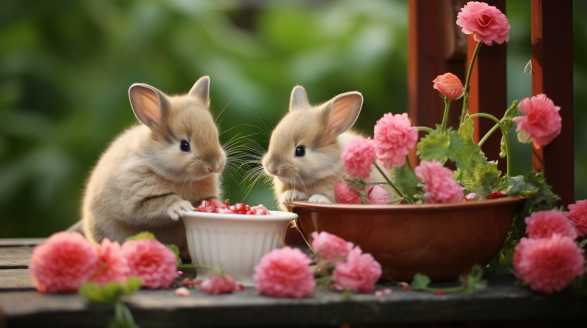
Do Rabbits Eat Geraniums
Introduction Do Rabbits eat Geraniums? Let’s find out in this comprehensive guide. I couldn’t help but wonder – what on earth could these fluffy creatures possibly find so alluring about my geraniums? Little did I know, this was just the beginning of a curious connection that would beckon me into the mysterious world of rabbits […]
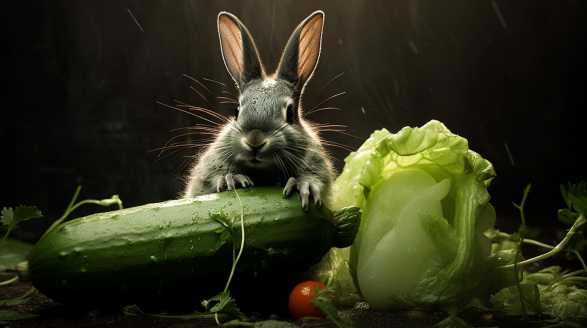
Can Rabbits Eat Cucumbers
Introduction Hey there, fellow bunny lovers! Are you ready to dive down the rabbit hole of cucumbers and their impact on our furry friends? Let’s find out, can rabbits eat cucumbers? Picture this: a world where your bunnies not only enjoy munching on their favorite treats but also stay hydrated, healthy, and have a smile […]
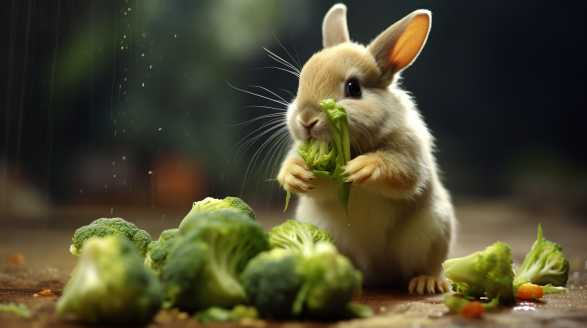
Can Rabbits Eat Brussel Sprouts
Introduction Can Rabbits eat asparagus? Let’s find out.. So let’s dive headfirst into this leafy green adventure together. We’ll explore the abundance of nutrients packed into those miniature cabbages, unravel the potential benefits and risks, and uncover the secrets to safely incorporate Brussel sprouts into your rabbit’s mealtime routine. Get ready for a thrilling ride […]

Do Rabbits Eat Coreopsis
Introduction Hey there, fellow garden enthusiasts! If you’ve ever found yourself face-to-face with adorable rabbits demolishing your beautiful coreopsis plants, then this article is just for you. But fear not! We’ve got your back with some brilliant strategies to prevent rabbits from turning your coreopsis dreams into a nibbled nightmare. Rabbits are cute and fluffy, […]
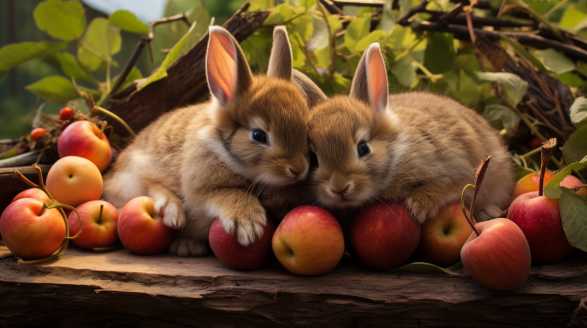
Can Rabbits Eat Nectarines
Introduction Can Rabbits eat nectarines? Let’s find out. Picture this: you’re sitting under the shade of a towering oak tree on a warm summer day, snacking on a ripe, succulent nectarine. The juice drips down your chin as you savor its sweet and tangy flavor. Well, get ready to hop down the rabbit hole because […]
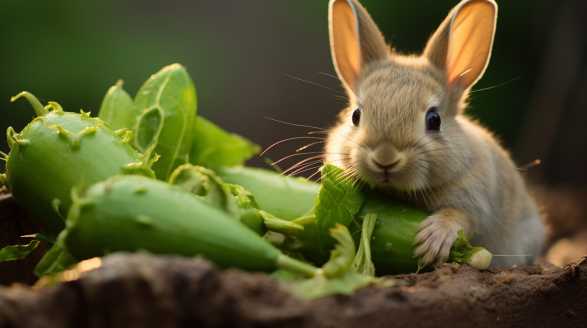
Can Rabbits Eat Okra
Introduction Can Rabbits eat okra? Let’s find out. We’re about to embark on an adventure filled with mysteries, health benefits, and the undeniable allure of okra for our furry friends. Picture this: you’re strolling down the vegetable aisle, and your eyes fall upon the vibrant green pods of okra. You’ve heard whispers about this veggie, […]
